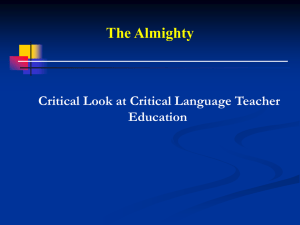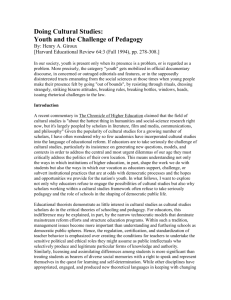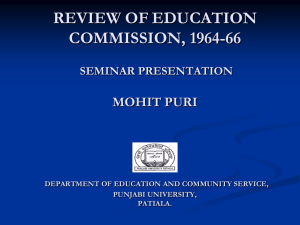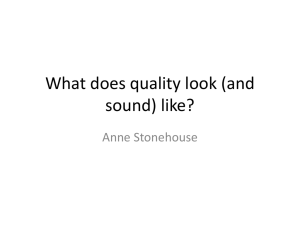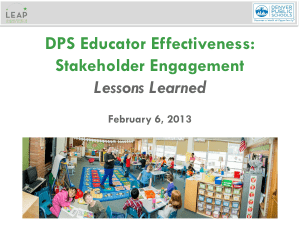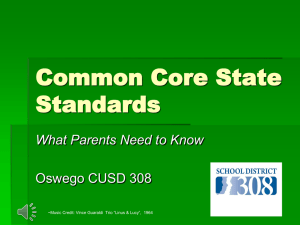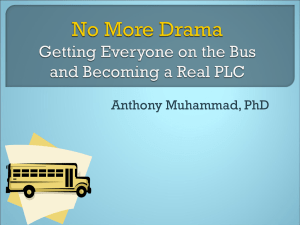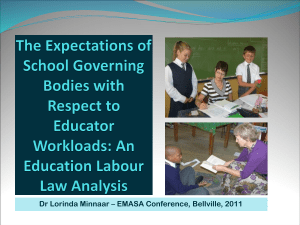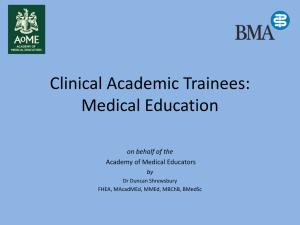The changing professional landscape for long
advertisement
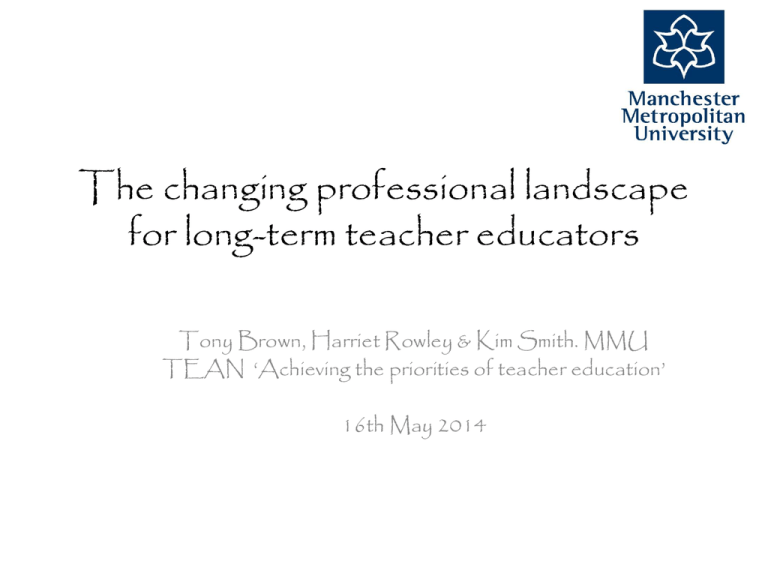
The changing professional landscape for long-term teacher educators Tony Brown, Harriet Rowley & Kim Smith. MMU TEAN ‘Achieving the priorities of teacher education’ 16th May 2014 MMU’s School Direct Research Project The presentation aims to capture how long-serving university teacher educators have experienced recent professional demands resulting from teacher education being located more in schools. It questions how this group have altered their own practice as teacher educators and how their attitudes to research as a dimension of the job have changed. It depicts some of the alternative attitudes taken to research and the implications for how research is understood. Context Expansion of school-based and school-led teacher training Impact on HEI’s • Academic element reshaped to meet the demands of immediate practice • Redistribution eroding key elements of university contribution • Boundaries between universities and schools becoming blurred and contested • Increasingly competitive market focused on compliance and opportunity resulting in fragmentation Impact on University Teacher Educators • Conceptions of ‘university teacher educator’ becoming redefined • Increased turbulence – ever-changing conditions and new job descriptions • Internal conflict between agencies and with individual’s histories and aspirations • Recent school experience favoured with less obligation to develop academic capabilities Literature • Policy changes to ITE have impacted on institutional structures and roles, organisational arrangements and research activity, (e.g. Browne et al, 2012; Childs, 2013) marginalising universities’ ability to maintain a distinctive/analytical dimension (Ellis et al,. 2013). • Teacher educator: ‘schizophrenic figure’ split across university/school, mainly doing ‘relationship maintenance’ (Ellis et al,. 2012). Disruption of previously ‘comfortable’ spaces into new forms of practice (Reynolds et al., 2013). • Teacher educators now supporting ‘trainee’ teachers to be ‘trained’ to comply with external demands rather than supporting autonomous ‘student’ teachers in being educated. (Brown and McNamara, 2011). • New entrants to HEI’s hold on school teacher identity rather than proactively seek identities as ‘academics’ (Boyd and Harris, 2010). • Substantive barriers in terms of career progression and involvement in research (White, 2014; Williams and Ritter, 2010; Van Velzen et al., 2010; McKeon and Harrison, 2010) • Gap in literature – the experience of longer serving teacher educators. Method • 49 teacher educators and teacher education managers interviewed across 14 institutions • 18 school managers and mentors interviewed across 9 schools • 17 SD PGCE trainees interviewed • Other supplementary data: conversations, meetings and lesson observation • Interviews designed to assess the impact of SD on a range of individuals variously implicated in the initiative. • Transcripts were produced followed by thematic analysis using Nvivo. Themes Interview topics included: • Length of involvement/ responsibilities in ITT. • Involvement in SD and difference to earlier models. • Changes to job definition. • Changing role/composition of theory and subject knowledge. • Distinctive role of universities. • Threat resulting from the increasingly marginalised position. • How partnership work with schools is changing. • Involvement in research or masters/doctoral studies. • The role of research in their practice. • Main challenges seen ahead for university training. • Affect on them personally. • How they think the role of universities needs to change. Four case studies of long-term teacher educators Lucy • Ambiguity around new arrangements. School-led training largely symbolic. " I found it confusing actually. I think what I’m finding confusing is ... that the training is the school’s responsibility … with the PGCE it’s our responsibility and the schools do their bit, whereas what I would expect with the School Direct is it’s the schools’ responsibility and we do that academic side of it, but I’m not convinced that’s true“ • Conflicts and inconsistency between university and school inputs. "It is really difficult and means that there are conflicts between what the subject mentor is saying and what I’m saying…He kind of agreed but said, ‘I don’t think it’s as bad as you think’ ". • Imposed models of teaching vs research informed models or pupil enquiry. “Nothing they seem to be doing bears any relation to any kind of research or ideas about learning or how kids learn…I think it’s really sad. [A really good student]… said something like, ‘what I’ve learned is that if you’re doing an investigation, it can’t last more than twenty minutes’… I’ve seen some really lovely ideas I would have spent hours on with kids. He allowed three minutes for it…and they did it! “I get very frustrated by it. I hate it. I hate the way teacher education is going at the moment. On the one hand I find it quite stressful. On the other hand I’m not that far off retiring and I don’t care. I sort of have this feeling of when it gets too much I’ll just retire. I mean, when I look back to when I started here and how things were, I just think it’s so sad how things have changed.” Ralph • Survival through responsiveness to changing agenda at the cost of suppressing professionally held principles. …principles ‘don’t pay the bills [Tutors and student teachers are] not expected to focus on one thing for very long any more. There isn’t the time nor the space for addressing whole piles of texts. We often give people readers and things, which are potted distillations of key ideas. Papers, which are shortish, they can get their heads around …get to the crux of the arguments people are making. • Dilemma – purported squeeze on time vs distinctive role of the university – rationalisation of the use of research evidence. [On school-based routes, trainees] have not got any significant time space or resource points to make hardly any significant connections between theory and practice… For example, …Kagan… you can’t guarantee that on a schoolbased route because the people who are doing the training haven’t got the theoretical base that they need, often, to be able to do that. So it’s low-level training producing people who can operate in that one context. • Solution – theory ‘not peddled for its own sake’. Consistent with external regulatory pressures, emphasis on utility. • Resignation of position – akin to Lucy. in your mid to late 50s you don’t feel as threatened about things because there’s always the retirement option in the end. Sarah • Engagement in doctoral studies providing analytical "tools to question and think through the changes" enabling her to identify demands which were a ‘tick box exercise’ as opposed to those which "that take us in a direction because that is where we want to go not because we are being made too." • Development of intellectual capabilities enabling her to "exercise her brain in more than one way" and have ‘me time’ in a system where individual emancipation was limited. • Disturbing consequences to subjective position resulting in unsettlement. Contact with theoretical lens "opened up everything that I do". Increase awareness of how spaces affect what is said resulting in questioning of own and others practice. Richard • Difficulties of balancing teaching and research activities meaning that many colleagues "to just give up in trying because it is often just not sustainable". • Engagement in research as key to maintaining integrity and developing a distinctive university contribution. • Crucial difference between research-informed as opposed to research-led teaching, former - simple expectation of all university level teaching but the latter is where "teaching sessions are deliberately planned to get research data for a particular purpose, research it and share with the students". Process seen as crucial for the development of student teacher’s subject pedagogical skills “…. to shift their thinking around one way, the whole point of that is to, recognise parallels between them and their thinking.” • Significant challenges - current staffing structures and framing of university distinctive contribution. Implications • School Direct is hardening the school /university divide whilst polarising attitudes to research • There is partitioning/redistribution of research between different classes of staff/universities. • The REF decides what is ‘acceptable’ (e.g. research conceptualised through natural science model) • Majority of institutions and most practitioners excluded from REF funded research. • Practice-related or personal research not valued by REF. • There is alienation from “research” as it is identified with REF rather than with practice • Practice-related research activity not so easily linked to research recognition • Research seen as found object (in papers or reports) rather than something built through practice. • Subject knowledge in schools becomes something that is received rather than negotiated in situ. • Practice is externally defined rather than built through reflective enquiry. • We have seen four alternative attitudes to making research awareness part of ITT. References Boyd, P. and Harris, K. 2010. Becoming a university lecturer in teacher education: expert school teachers reconstructing their pedagogy and identity. Professional Development in Education, 36(1-2): 9-24. Browne, L. and Reid, J. 2013. Changing localities for teacher training: the potential impact on professional formation and the university sector response. Journal of Education for Teaching: International research and pedagogy, 38(4): 497-508 Brown, T. 2008. Desire and drive in researcher subjectivity: The broken mirror of Lacan. Qualitative Inquiry, 14(3): 402-423. Brown, Hodson, E. & Smith, K. 2013. TIMSS maths has changed real maths forever. For the Learning of Mathematics, 33(2) Brown, T., and McNamara, O. 2011. Becoming a mathematics teacher. Identity and identifications. Dordrecht: Springer. Childs, A. 2013. The work of teacher educators: an English policy perspective. Journal of Education for Teaching: International research and pedagogy, 39(3): 314-328. Ellis, V., Glackin, M., Heighes, D., Norman, M., Norris, K., Spencer, I. and McNicholl, J. 2013. A difficult realisation: the proletarianisation of higher education-based teacher educators. Journal of Education for Teaching: International research and pedagogy, 39(3): 266-280 Ellis, V., McNicholl, J. and Pendry, A. 2012. Institutional conceptualisations of teacher education as academic work in England. Teacher and Teacher Education. 28(5): 685-693. Harrison, J. and McKeon, F. 2010. Perceptions of beginning teacher educators of their development in research and scholarship: identifying the ‘turning point’ experiences, Journal of Education for Teaching: International research and pedagogy, 36(1): 19-34 McKeon, F. and Harrison, J. 2010. Developing pedagogical practice and professional identities of beginning teacher educators. Professional Development in Education, 36(1-2): 25-44 Reynolds, R., Ferguson-Patrick, K., and McCormack, A. 2013. Dancing in the ditches: reflecting on the capacity of a university/school partnership to clarify the role of a teacher educator. European Journal of Teacher Education. 36(3): 1-13 Smith, K. and Hodson, E. 2010. Theorising practice in initial teacher training. Journal of Education for Teaching, 36(3): 259-275. Smith, K., Hodson, E. and Brown, T. 2013. Teaching educator changing perceptions of theory. Educational Action Research Journal. 21(2): 237-252. Smith, K., Hodson, E. and Brown, T. 2013. The discursive production of classroom mathematics. Mathematics Education Van Velzen, C., van der Klink, M , Swennen, A. and Yaffe, E. 2010. The induction and needs of beginning teacher educators, Professional Development in Education, 36(1-2): 61-75 White, E. 2012. Exploring the professional development needs of new teacher educators situated solely in school: pedagogical knowledge and professional identity Professional Development in Education, 39(1): 82-98. White, E. 2014. Being a teacher and a teacher educator – developing a new identity? Professional Development in Education Williams, J. and Ritter, J. 2010. Constructing new professional identities through self‐study: from teacher to teacher educator, Professional Development in Education, 36(1-2): 77-92.
